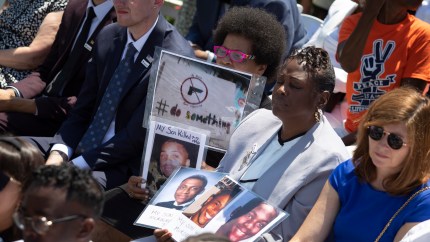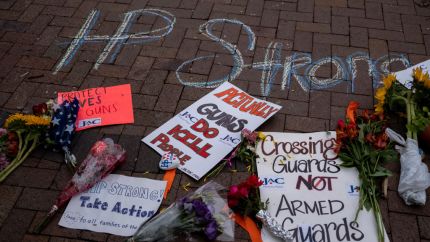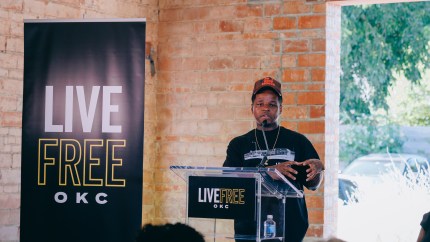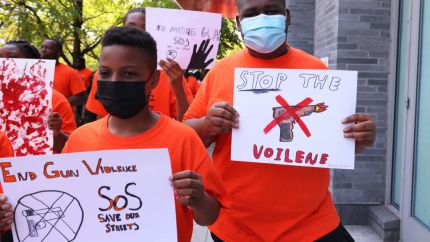After someone killed Jabee Williams’ brother, he wanted revenge. He opted to save lives instead
The young violence interrupter reflects on a formative years and the work he and other "peacemakers" train to do.
When Jabee Williams got the call from his parents that his brother was shot and killed in Oklahoma City, he didn’t know that would help define the rest of his life. At that moment, he only felt pain.
“I grew up around violence, gangbanging, and all that stuff,” Williams told theGrio.
While at the hospital and still grappling with the death of his sibling, a lot of thoughts went through his head, Williams recalled, including considering getting revenge against whoever took his brother from him and the rest of the family.
“Somebody came up to me and intervened with me, and had that not happened, there’s no telling where I would be right now,” Williams said.
Today, Williams is the leader of Oklahoma’s first community violence intervention program. He wants to help people the same way he was helped after his brother was killed in 2001.
In recent years, violence intervention and prevention programs have become a priority for cities and communities that struggle with gun violence.
These programs typically use violence interrupters or credible messengers who have strong ties to the neighborhoods where the violence occurs. They’re able to have conversations and get in front of people who are involved in the shootings, either victims or perpetrators.

Nationwide, more investment has been made in these initiatives. That investment includes $2 million for 35 programs across the country from a national nonprofit, millions of dollars in federal funding for a variety of programs, and a dedication to more federal actions with the creation of the first-ever federal office dedicated to preventing gun violence.
“When you look at this issue, it affects us all,” Williams said. “Policymakers, stakeholders, community leaders, and the police department. We all have to work together on this.”
Williams runs Live Free OKC, which started in August 2023 and is a subsidiary of Live Free USA, a national gun violence prevention organization. Williams had already been a community activist in Oklahoma City, but with the backing of a national organization, more resources were made available to him and the others on the ground.
Live Free OKC has four full-time violence interrupters, or as they call them, “peacemakers,” as well as a life coach. These peacemakers identify those who might be responsible for gun violence and attempt to intervene and keep them from getting involved in violence.
They also help address whatever problems those individuals might have with housing, employment, food, and mental health. “These guys are professionals. What we do is for real,” Williams said. “We’ve had hours and hours of training to make sure we’re properly prepared in a professional way.”
It was just happenstance that three shootings occurred right around the time Live Free OKC got started, including one at a state fair and a high school football game. They immediately responded to these incidents.
Recommended Stories
“We had these meetings with some of the OGs and tried to figure out how we can resolve these beefs going on because a lot of the gun violence stems from the gangs,” Williams said. “So we’re really trying to stop these little street conflicts that tend to escalate into bigger beefs.”
The group also collects and analyzes data from their outreach. “We have to show that what we’re doing actually works,” he said.
Killings and gun violence in Oklahoma City have followed a trend that’s slightly different from those in other American cities over the last several years. In 2019, there were 88 homicides in the city. That number decreased to 76 in 2020, increased to 93 in 2021, and decreased 20% in 2022 with 73 homicides. Most of these homicides were the result of gun violence.
On the law enforcement side, the Oklahoma City Police Department did not go through any defunding or reallocation of funds. In fact, the department added positions after a short hiring freeze in 2021.
Williams looks at the ebb and flow of the shootings as a result of an inconsistent approach to tackling the violence, especially from the community side. He said some people have a lot of assumptions about violence prevention work.
“When we say we want to reduce violence, some people think we’re talking about starting a boxing program, or a little league or an afterschool program, and that’s not what we do,” Williams said. “We aren’t the Boys and Girls Club. Playing basketball at the Boys and Girls Club isn’t community violence intervention.”
Their work is about being outside, face-to-face with those involved in the violence.
As he looks ahead to 2024, Williams said he hopes that people in the city remember how important the problem of violence is and not only focus on it when it happens in the suburban areas. He also hopes the organization will continue to grow and continue to educate the community on their work.
“People need to understand that this is a profession,” Williams said. “This isn’t something you do on your time off. Our guys are 24/7. Violence can occur at any time, so they’re always on the clock.”
Never miss a beat: Get our daily stories straight to your inbox with theGrio’s newsletter.








